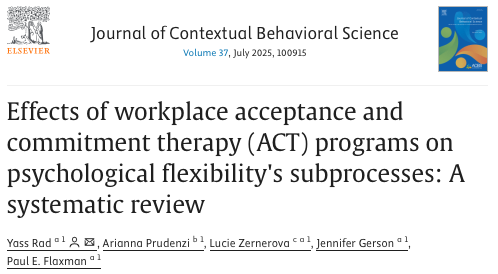Journal of Contextual Behavioral Science (JCBS)
Volume 37, July 2025
Authors
Yass Rad, Arianna Prudenzi, Lucie Zernerova, Jennifer Gerson, Paul E. Flaxman
Key Findings
- Effects of workplace ACT programs may have been obscured in previous meta-analyses.
- In this review, workplace ACT programs were found to improve defusion, present moment awareness, and acceptance.
- Longer-term benefits of ACT for staff mental health may be particularly influenced by defusion and acceptance.
- Future workplace ACT research should utilize multidimensional measures of psychological flexibility.
Abstract
Despite growing interest in applying acceptance and commitment therapy (ACT) in workplace settings, recent reviews raised doubt about the efficacy of staff-focused ACT programs for improving psychological flexibility. However, more specific processes targeted by these programs may have been obscured by aggregating effects across a wide array of psychological flexibility measures for meta-analytic review purposes. To investigate this possibility, the current systematic review examines workplace ACT intervention effects on psychological flexibility's subprocesses (i.e., contact with the present moment, acceptance, defusion, self-as-context, values, and committed action). The review protocol was registered with PROSPERO (reference: CRD42022349446). The literature search identified 30 staff-focused ACT trials (18 controlled trials) that administered measures that could be mapped onto one or more psychological flexibility subprocess. Collectively, this body of research indicates strongest evidence for the effectiveness of workplace ACT programs for targeting defusion (observed across three types of defusion measures), and moderate yet consistent evidence that these programs increase mindful awareness and acceptance. Due to measurement issues, effects on values-based action have been less consistent overall. The next generation of workplace ACT research could be advanced by 1) adopting multidimensional psychological flexibility and inflexibility instruments, 2) subprocess-level multiple mediation testing, and 3) increasing methodological quality.
